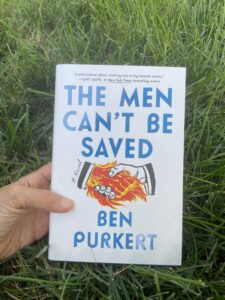
Click image to register!
Ben Purkert, former Rutgers Creative Writing Professor and author of the best-selling novel The Men Can’t Be Saved, is coming back to Rutgers! Join us on Thursday, January 11, 2024 at 2:00 PM EST to discuss The Men Can’t Be Saved: A Novel, and how it connects to human experience in the workplace.
The event is free and open to the public, sponsored by Rutgers Winter Session. All registrants will automatically be entered in a drawing to win 1 out of 80 copies of Ben’s novel, 30 of which will be distributed to read prior to the event. Interested in the event and a free book?
The Men Can’t Be Saved: A Novel is now available online from Rutgers Libraries! A few thoughts while reading it:
I know this dude! I bet you know him too.
- He is your coworker, who can’t hold his liquor, but this doesn’t stop him from chugging down the free booze at the office holiday party, after which no one talks about what exactly happened to that girl from the second floor. You still remember how the attendance at the company’s self defense classes picked up in January, not only as a New Year’s Resolution.
- He is your neighbor, who was just fired from his job last week. When your bladder wakes up at odd hours, you can see random cars pulling over, always a BMW or Mercedes, for a quick transaction through the basement window. Grandma should have kicked him out long ago, you think, before you fall asleep.
- He is your Uncle Charlie, whose nicotine-stained, wet kisses made you sick to your stomach as a little girl, while he sank through the ranks from Captain to a dishonorable discharge from the army, bottoming as a grave digger, only to be sacked from the funeral company. You still wonder if your cousin Charlie is in jail for cheating Aunt Maggie out of her pension to cover his gambling debts.
- He is your third ex-boyfriend, who didn’t drive but always opened the door for you on the driver’s side, which was good enough for your mom to strongly encourage you to marry him, just to kick you out of the family home. You are still counting your blessings that, against her will, you first moved in with him without tying the knot, only to find out the many faces of liars, cheats, and thieves.
He is your best friend’s brother-in-law. He is your almost-son-in-law. He is your father, your brother, your husband, your son, your grandson, with the promise of positive traits – if you can look close enough.
Advocating the bibliotherapy-inspired approach, we like focusing on texts that speak to us, make us reflect on our own struggles, with the potential of helping accept reality and responsibility. The Men Can’t Be Saved seems to check all the boxes.
More thoughts after finishing it. The book is now available online from Rutgers Libraries!
The Everyday Hero
Right up to the face of heroes and heroines of books, movies, and video games, distant relatives of the ultimate Romantic hero, here’s this dude, Seth, more like a 21st-century, American version of the “superfluous man” from 19th century Russian novels, except with greater mobility. Driving around, Oblomov he is not, although his own comfort and causes are similarly more important for him than caring for the welfare of others, let alone social issues. Of course, this pace has sped up in the past two centuries or so, well reflected in the novel.
Born into privilege, if not necessarily wealth, by modern American standards, Seth is a mediocre white protagonist quite similar to the “superfluous man” in the behaviors he exhibits. This includes using illegal substances, gambling his luck away and pursuing romantic goals beyond his reach, all while letting opportunities (and life) pass him by. There’s even a slight hint to a heroic sacrifice to risk his life in his pathetic “duel” with Moon (his former boss) to restore his honor. Looks like there are a lot of “superfluous man” characters in the book; some characters pushed to their limits to illustrate the statement in the title, and, we must admit, some female characters who don’t fare any better either.
The Journey
Nonetheless, the innocent reader would expect some kind of a positive outcome from the heroes (mostly of dubious character) and the setting (toxic work environment turned into disaster zone); for example, on a journey to self-discovery, an egocentric man-child growing up and taking responsibility, in pursuit of his identity. Instead, we end up with this attention-seeking, immature schlemiel, stumbling around, without a climax or satisfying ending, without any hope of change, maturing, or redemption.
While Seth’s quixotic odyssey is far from being magnificent and social media-worthy, it’s adventurous and true to character. Moving around in the world, geographically and socially, our protagonist makes mistake after mistake, from career suicide to killing personal relationships with family and friends, going down the rabbit hole he digs for himself with or without contributors. It’s a hole, not a tunnel. There’s no light at the end.
Language
The most astonishing part in The Men Can’t Be Saved is its language. In stark contrast with the over-confident millennials echoing around us, Ben Purkert’s voice expresses underlying insecurities across generations, ages, and gender. In a world where women, for all our assertiveness and equal (if not superior) performance, still have to consider going through that pesky pay equity raise process more often than men, using language to close the confidence gap from the other end goes a long way.
The mental state of his characters, ranging from existential boredom to the latest hype, is well defined by both their actions and language. It is funny and self-deprecating on one page, then philosophical on the next, as the text shifts quickly between the mundane and the deeper issues of life and death.
Glimpses of hope for redemption also come from some of the supporting characters through language and the narrative, written by the poet-author, rather than the debut novelist.
Readers
 “The most exciting book that I haven’t read” – claims a reader. Well, I have, so here are few questions to the reader.
“The most exciting book that I haven’t read” – claims a reader. Well, I have, so here are few questions to the reader.
- Do you find Seth arrogant and annoying? Delusional? A schlemiel in both cultures? A product of cut-throat corporate America? Deeply disturbed? Sad? Depressed because isolated?
- Does he hear “the sound of no voice but his own?” Don’t we all sometimes?
- Does he feel disturbed and disgusted by Moon? Do you? Which traits in a person make you feel the most uncomfortable?
- Have you experienced people with sudden erratic behavior in your environment, male or female? How did you deal with them?
- Do you consider the supporting female characters realistic? Enablers? Lost in time? Or in their own world? Can they be saved? A word of advice to them?
- Do you find the narrative unpredictable? Too predictable? White men creating first-world problems? Supporting characters equally pathetic? Some scenes morbid? Homoerotic? Upsetting and funny at the same time?
- Is the story too far fetched? Too farcical? Too much drugs, sex, and rock and roll? Too much religion? Too little? From the wrong angle?
- Is the book a delayed onset anti-Bildungsroman? Humor fiction? Satire? FAFO-novel?
- Do you have any advice for the Seths and Moons of our world? How about yourself?
Would I recommend the book for your next book club? Oh yes, there’s a lot to talk about. Unlike what happens to Seth in the book – opinions, including what others read into a text, do matter, should be heard, and challenged.
I know this dude. You know this dude. And he knows you too. We are looking forward to reading Ben Purkert’s next book!

Author Talks Series: Ben Purkert (top) talking with Javier Zamora (bottom) at the 2023 Summer Session event. Who’s going to interview Ben in 2024?
Read the book
More resources
Reviews
- Publishers Weekly
- Kirkus Reviews
- Esquire
- Readers on Goodreads